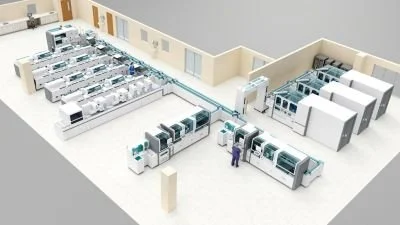Vanderbilt Labs Incorporate Automated, Modular Transport System
In October 2023, Roche announced its US launch of the cobas® connection modules (CCM) Vertical, the elevator and overhead components of its fully automated and modular CCM system to help low-, mid- and high-volume laboratories optimize space, productivity, and patient care. The system is designed to help lab staff simplify operations by transporting patient samples hands-free in every direction—up, down, across and between rooms, around doorways, emergency exits and walkways, and through walls, ceilings and floors. The first CCM Vertical implementation in the US is scheduled to go live at the Vanderbilt University Medical Center Diagnostic Laboratories in early 2024.
Lab Design News spoke with Joe Wiencek, PhD, DABCC, Service Line Medical Director of the Core Laboratory, Vanderbilt University Medical Center, Associate Professor of Pathology, Microbiology, and Immunology, Vanderbilt School of Medicine, about the implications of this new system and how it was incorporated into his lab.
Vanderbilt University Medical Center Diagnostic Laboratories. Image: Courtesy of Roche Diagnostics
Q: Why are you implementing the CCM Vertical?
A: The CCM vertical lift will be implemented to allow for interconnectivity of lab sections and specimen workflow within the clinical laboratory.
Q: Is there anything particularly unique or groundbreaking about your facility or the design plan?
A: The facility was designed in a manner to allow for lean flow of specimens throughout the testing process and to leverage automation where appropriate.
Vanderbilt University Medical Center Diagnostic Laboratories. Image: Courtesy of Roche Diagnostics
Q: What sorts of challenges did you encounter during the renovation/build process, and how did you overcome them?
A: I think the biggest challenge was to make sure each section of the clinical laboratory was connected as much as possible.
Q: If a similar facility or program were to look at your lab for inspiration, what do you think they will take away as an example of what they should also implement in their own lab?
A: I think the most important aspect is setting up the future of the laboratory in the design process. In other words, it is important to plan for the lab that is needed today and actually even more important to plan for the lab that will be needed in the future. Our committed team of laboratorians at Vanderbilt had this in mind in each step of the design process and I confidently believe this mindset will be a key to our success in providing our patients their test results.


